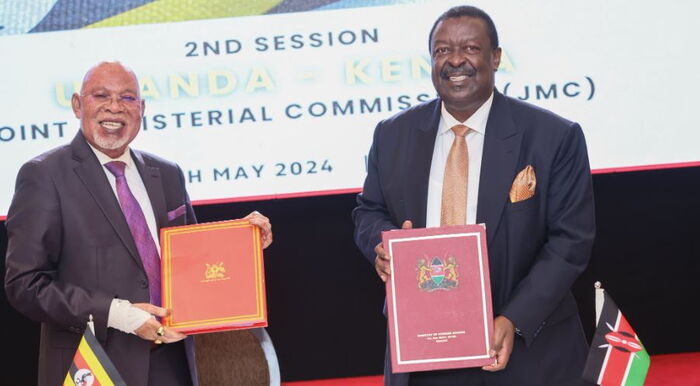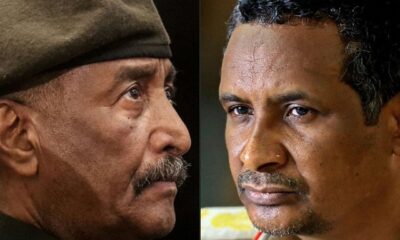
Kenya, Uganda Ink Trade Deals for Bilateral Boost – The East Observer
Summary:
Foreign Affairs officials from Kenya and Uganda signed seven MoUs to strengthen trade ties, addressing barriers and paving the way for a State visit by the Ugandan President. Recent tensions, including disputes over mineral exports and trade restrictions, prompted interventions, leading to resolutions and a commitment to enhance cooperation.
Foreign Affairs Cabinet Secretary Musalia Mudavadi and his Ugandan counterpart General Odongo Jeje Abubakhar took significant strides towards bolstering trade relations between their respective nations during a Joint Ministerial Commission (JMC) held in Kampala, Uganda.
The focus of the meeting was to mitigate trade barriers hindering the smooth flow of commerce between Kenya and Uganda. As a result of fruitful discussions, the two officials signed seven Memoranda of Understanding (MoUs) covering key areas such as diplomatic training, public service management, education, youth affairs, sports, trade and investment, as well as the development of Small and Medium Enterprises (SMEs).
The JMC’s importance was underscored by its role in setting the stage for Ugandan President Yoweri Museveni’s forthcoming two-day State visit, commencing on May 15th.
Addressing the persistent challenges posed by Non-Tariff Barriers (NTBs) to cross-border trade, Mudavadi expressed the need for thorough deliberations to reach conclusive solutions. He also highlighted the significance of addressing immigration issues, boundary reaffirmation, and other cross-border matters to facilitate smoother interactions between the two nations.
General Abubakhar echoed Mudavadi’s sentiments, emphasizing the importance of resolving constraints to foster mutual understanding and deepen bilateral cooperation.
Recent tensions between Kenya and Uganda, including disputes over mineral exports and trade restrictions, prompted interventions from both governments. Notably, President Museveni lifted a 12-year ban on mineral exports following negotiations with President Ruto. Kenya reciprocated by lifting a ban on powdered milk imports from Uganda, stimulating market demand.
Another contentious issue involved Uganda’s access to the Mombasa Port for petroleum product transportation, which Kenya initially denied. This disagreement prompted Uganda to explore alternative importation avenues through the Uganda National Oil Company. However, subsequent discussions between Museveni and Ruto resulted in the resolution of the impasse.
The efforts of Mudavadi and General Abubakhar signify a commitment to fostering stronger ties between Kenya and Uganda, paving the way for enhanced trade cooperation and shared prosperity for both nations.
Follow @observerkenya
Your Page Title
The East Observer®.
We come to you.
Want to send us a story or have an opinion to share? Send an email to editorial@observer.co.ke or Join Our WhatsApp CHANNEL
https://www.observer.co.ke/africa/kenya-uganda-ink-trade-deals-for-bilateral-boost/?utm_source=rss&utm_medium=rss&utm_campaign=kenya-uganda-ink-trade-deals-for-bilateral-boost
News
Ugandan Citizen Abducted, Held in Secret Detention for Three Months, Sparks Outrage and Calls for Justice

A disturbing new case of unlawful detention has surfaced, highlighting the ongoing human rights crisis in Uganda. A Ugandan citizen was reportedly abducted and held in a secret facility, known as a “safe house,” for three months, only to be released without charge or explanation. This incident, reported by NTV Uganda, has sparked widespread condemnation and renewed calls for accountability regarding human rights abuses in the country.
While the details surrounding the abduction remain unclear, reports indicate that the individual was taken without due process and held incommunicado—an action that has long been condemned by human rights organizations. The victim’s release, with no charges filed and no clear justification, has angered activists and citizens, who view this as yet another case of egregious abuse of power by the state.
“This is a recurring pattern,” said one human rights activist. “Abductions, secret detentions, and unexplained releases have become all too common in Uganda. These acts violate fundamental human rights and erode public trust in the justice system.”
The use of “safe houses,” unregistered detention facilities reportedly operated by security forces, has been a focal point in numerous allegations of torture and illegal imprisonment. Despite repeated calls from both local and international organizations for their closure and accountability for those involved, little action has been taken to address these violations.
This case underscores the urgent need for reform within Uganda’s security apparatus and greater accountability for human rights abuses. Observers hope that drawing attention to these injustices will spur concrete action to bring those responsible to justice and ensure the protection of basic human rights.
As frustration mounts, calls for both domestic and international pressure to hold the government accountable for such crimes grow louder. “One day, there must be accountability for all these crimes against our people,” stated one social media user, reflecting the sentiments of many Ugandans.
News
NUP Gathering Disrupted: Kyagulanyi Alleges Security Force Harassment and Arrests

National Unity Platform (NUP) President Robert Kyagulanyi has accused Ugandan security forces of using excessive force to disrupt a planned NUP gathering. The allegations were detailed in a statement shared on Twitter, following an event held to honor children of NUP supporters who were killed, disappeared, or detained for their political beliefs.
According to Kyagulanyi, security personnel, under the command of an officer identified as Asiimwe, carried out a preemptive operation early in the morning upon learning of the NUP’s plans. The forces allegedly stormed the premises, arrested workers, and deployed tear gas to disperse those present.
“The criminals under the command of one Asiimwe deployed early morning, arrested our workers, and threw tear gas into our premises. They’ve cordoned off the premises and blocked all people from accessing the place,” Kyagulanyi wrote.
Among those reportedly arrested were Saava Peter, Mudenya Samson, and Turyasingura Samson. Kyagulanyi claimed the detained workers were subjected to beatings and interrogated about their political affiliations, with security operatives labeling them as terrorists.
“These JATT operatives asked the workers who they support politically, branding them terrorists and criminals—their only crime being that they work with us. You can imagine the indignity!” Kyagulanyi lamented.
This incident adds to the growing tension in Uganda’s political climate, where opposition parties frequently accuse the government of stifling dissent. Despite the challenges, Kyagulanyi ended his statement with a message of defiance and optimism, proclaiming, “UGANDA WILL BE FREE.”
NUP Gathering Disrupted: Kyagulanyi Alleges Security Force Harassment and Arrests
News
Sudan Demands Apology from Uganda Over Army Chief Muhoozi Kainerugaba’s Threat to Invade Khartoum

Sudan has demanded an official apology from Uganda over “offensive and dangerous” comments made by the chief of Uganda army staff, who threated to invade Khartoum, the Sudan Tribune has reported.
General Muhoozi Kainerugaba, son of Ugandan President Yoweri Museveni and CDF of the Ugandan army, posted two comments on the X platform on Tuesday in which he threatened “to capture Khartoum” with the support of the US President elect Donald Trump after he takes office. The posts were deleted later.
“The government of Sudan demands and official apology from the Ugandan government for the offensive and dangerous comments of the army commander,” Sudan’s foreign ministry said in a statement that the Sudan Tribune said it has seen.
Sudan Demands Apology from Uganda Over Army Chief Muhoozi Kainerugaba’s Threat to Invade Khartoum









